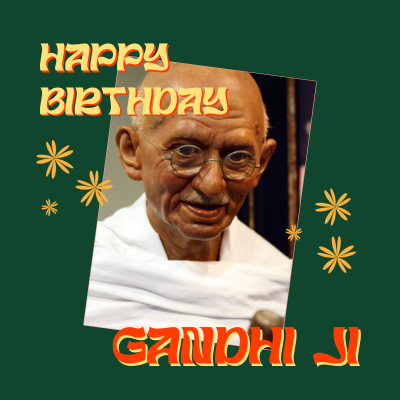MAHATHMA GANDHI JI
Mahathma Gandhi Ji ‘s Assasination
Unfortunately, Mahathma Gandhi Ji was assassinated on January 30, 1948. Although he was called as Father of our Nation, he was killed by a Nationalist. A division of Nationalists disagreed with Gandhiji’s views on nonviolence and religious tolerance while Hindu brothers and sisters were killed and raped by Muslim fanatics. However, his principles and ideals continue to inspire people worldwide in the pursuit of justice, peace, and freedom. Gandhi’s birthday, October 2nd, is celebrated as Gandhi Jayanti in India and is recognized internationally as the International Day of Non-Violence.
Legacy of Mahathma Gandhi Ji
Mahatma Gandhi’s legacy extends far beyond India. He inspired civil rights movements and leaders around the world, including Martin Luther King Jr. in the United States and Nelson Mandela in South Africa. His ideas of nonviolence and civil disobedience continue to influence movements for social justice globally.
Mahathma Gandhi Ji
His full name was Mohandas Karamchand Gandhi, was a prominent leader of the Indian independence movement against British colonial rule. Bapu ji was born on October 2, 1869, in Porbandar, Gujarat, India. And he played a significant role in India’s struggle for freedom through nonviolent civil disobedience and passive resistance.
Here are some key points and aspects of Mahatma Gandhi’s life and philosophy:
Nonviolence (Ahimsa)
Mahathma Gandhi Ji is the best known for his philosophy of nonviolence, or “Ahimsa”. So he believed in the power of peaceful resistance and non-cooperation as a means to achieve social and political change. The approach to conflict resolution involved refusing to use violence even in the face of oppression appreciated by all.
Civil Disobedience
Our Gandhi Ji popularized the concept of civil disobedience. Which involves deliberately breaking unjust laws and accepting the consequences as a form of protest. He led various campaigns of civil disobedience, such as the Salt March, which challenged British salt monopoly laws.
The Dandi March or Salt March by Mahathma Gandhi Ji
One of Gandhi’s most famous actions was the Salt March (or Dandi March) in 1930. He walked 240 miles to the Arabian Sea to produce salt from seawater in defiance of British salt taxes. This event drew worldwide attention to the Indian independence movement.
Indian Happy Independence from British
Under the Gandhi’s leadership and nonviolent resistance tactics played a crucial role in India. Barath gained independence from British colonial rule on August 15, 1947.
Satyagraha
Gandhi coined the term “Satyagraha,” which means “truth force” or “soul force.” It encapsulates his belief that nonviolent resistance can bring about social and political change by appealing to the moral conscience of the oppressor.
Simple Living
Gandhi who lived a simple and austere life and wore traditional Indian clothing. He advocated for self-sufficiency through spinning and weaving (khadi). And he adhered to a vegetarian diet. His lifestyle was meant to symbolize his commitment to simplicity and non-materialism.
Religious Tolerance
Gandhi was known for his respect for all religions and his belief in religious pluralism. On the one hand he often used religious teachings to promote unity and tolerance among different communities. However this technique not worked in some parts of Independent India. In spite of his ahimsa and tolerance Gandhiji was not able to control the Muslim people. Which resulted 1000s of Hindus killed and raped during the time.
Coimbatore
The Coimbatore city located in the southern Indian state of Tamil Nadu, has historical connections with Mahatma Gandhi, although he did not spend a significant amount of time there. Nevertheless, the city played a role in India’s struggle for independence, and Gandhi’s influence extended to the region. Here are some points of connection between Coimbatore and Mahatma Gandhi Ji.
Mahathma Gandhi Ji ‘s Visit to Coimbatore
Mahatma Gandhi visited Coimbatore on a few occasions during his various journeys across India. One notable visit was in 1921 when he came to Coimbatore as part of his efforts to promote the Non-Cooperation Movement, which was a key element of the Indian independence struggle. During this visit, he gave speeches and engaged with the local population to encourage them to join the movement and boycott British institutions and products.
Mahathma Gandhi Ji ‘s Influence on Local Fredom Struggle
Gandhi’s philosophy of nonviolence and civil disobedience had a significant impact on local freedom fighters and leaders in Coimbatore and the surrounding region. His ideas inspired many to participate in the struggle for independence and to engage in various forms of peaceful protest against British colonial rule.
Coimbatore Role in the Freedom Struggle
Coimbatore, like many other cities and regions in India, witnessed active participation in the Indian freedom struggle. Local leaders and activists, influenced by Gandhi’s principles, organized rallies, protests, and campaigns aimed at achieving self-rule for India.
Legacy of Mahathma Gandhi Ji in coimbatore
Today, Coimbatore, like the rest of India, remembers and honors Mahatma Gandhi for his pivotal role in the country’s independence movement. His principles of nonviolence and civil disobedience continue to be relevant, and his legacy is celebrated throughout the nation.
While Coimbatore does not have as strong a historical association with Gandhi as some other cities in India, his ideas and influence were felt in the region, and his visits there left an imprint on the local freedom struggle. Gandhi’s teachings continue to inspire people in Coimbatore and beyond in their pursuit of justice, peace, and freedom.








